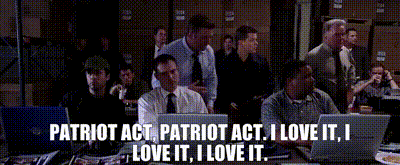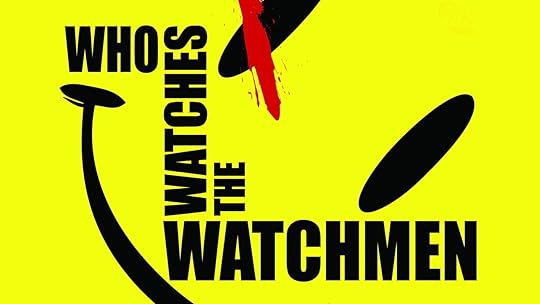We're getting screwed
Usually, our gardener wants to chat about plants. But sometimes Raphael just wants to chat, which great, because I love to chat too, unless I’m on deadline. This week, I wasn’t on deadline, and Raphael had a twofer. We talked about weed treatments, and after we settled that, we dove into the heavy shit.
“Did you know the government is spying on us?” Raphael asked. “I’m listening to Edward Snowden’s book, and I realized, wow, we live in a surveillance state.”
I didn’t have Edward Snowden’s 2019 book, Permanent Record, on my 2025 bingo card, but it’s been a weird year as far as metaphorical bingo cards go. Also, that was besides the point. Whatever you think of Snowden, you’d have to be a dipshit, bootlicker, jingoist, or NSA employee to deny the existence of the surveillance state and its for-profit cousin, the surveillance economy.
“When I was younger and living in El Salvador, my boss warned me not to go to protests because the government takes pictures of the people who are there,” Raphael said. “Later, they use those photos to discredit you, to call you a Communist, or whatever the undesirable thing is. They can ruin your life.”
Historians like to say that history doesn’t repeat itself, but it rhymes. Life in twenty-first century America wasn’t a rerun of life in twentieth century El Salvador, but it rhymed.
“It was harder to do that back then,” I said. “Not nearly as many cameras. No computers. And they had to physically put a tap on your phone. Now, we pay a lot of money to carry around devices in our pockets that spy on us. We tell social media platforms and Google everything about us, and they lease our secrets to the highest bidders. There are cameras everywhere these days. And artificial intelligence makes it possible to sift through information at scale. Plus, Alexa! And I’m pretty sure my thermostat is compromised too.”
I sounded like an ad for the Electronic Frontier Foundation. But this wasn’t the first time I’d climbed onto my soap box. I’ve been worried about this shit for decades.

But as it turned out, Raphael didn’t want to discuss surveillance, per se. He was more concerned with what the surveillance state revealed about power in America. The way he saw it, a surveillance state meant that everything was knowable, but not everyone was accountable.

“I don’t think we’ll ever know the truth about this Epstein guy,” Raphael continued. “Too many powerful people are above the law. Maybe they’re guilty, maybe they’re innocent — but we’ll never really know the truth because they have the power and we don’t.”
This was a heavy topic for a Tuesday afternoon in July. For weeks, the Epstein case, the valid but unanswered questions associated with it, the wild conspiracy theories that multiply like Gremlins in the rain, and the dumbest cover-up in the history of dumb cover-ups had swallowed America’s attention the way a black hole swallows light. But this wasn’t about Epstein, not really. Epstein was just the example du jour — an all-purpose meme that signified something rotten in our system. Raphael could’ve just as easily been talking about a Congress that grants its members immunity from insider trading laws, or a Supreme Court that believes in kings but not bodily autonomy, or a President who insists on cutting taxes for the rich, raising taxes on the poor, and financing the difference with debt that future generations, i.e. today’s children, will have to pay.
“You’re right,” I said. “Too many powerful people are above the law.”
“You and me have to obey, but the rich and powerful don’t. That’s not law.”
“Nope.”
“So we’re screwed?”
I could’ve said yes. That would’ve been the easy answer. But I don’t believe in easy answers, and I don’t believe we’re screwed.
“We’re getting screwed,” I said. “Understand the difference?”
He didn’t.
“If we’re screwed, it’s game over. Might as well pack it in, go home, and put that Leonard Cohen song on repeat.”
“But if we’re getting screwed, we still have agency, we can do something about it.”
Raphael laughed. I could tell he thought I was being naive. Maybe I was being naive. Maybe. But the thing about history, aside from the rhyming, is that it’s the product of action. Sure, history is loaded with bastards, shitheads, and evil motherfuckers. But it’s also the story of progress, which is to say, history is the story of regular people using their agency to push back on the bastards, shitheads, and evil motherfuckers who stand in the way of progress.
“It’s like the situation with the weeds,” I said. “If we don’t do anything, what happens?”
“Oh my god, they ruin everything.”
“So we do something about the weeds, right?”
“Yes. But they come back. They always come back.”
“Which is why we never stop.”
A new project from yours truly: Slacker NoirI launched a new newsletter called Slacker Noir. It’s a place for me to talk about crime & mystery fiction and share book news, like how I’m making good progress on a sequel to Not Safe for Work. Slacker Noir is free, and true to the slacker ethos, I’ll send out new posts when I get around to it.
A book for people who 💙 this newsletterNot Safe for Work is a slacker noir murder mystery set against the backdrop of the porn industry at the dawn of Web 2.0. Like everything you read here, the novel is based on my personal experience, and it’s funny as hell. If you love Situation Normal, there’s a 420 in 69 chance you’ll love Not Safe for Work.
Not Safe for Work is available at Amazon and all the other book places.
*The ebook is .99, so you can’t go too far wrong. Just sayin’.
IAUA: I ask, you answerAre we screwed, or are we getting screwed? Go deep!
What do you talk about with your gardener?
Leonard Cohen’s music bums me out, but I love it. What artists do you love even though their work bums you out?
Who watches the watchers? Asking for society.
Support Situation Normal — You know you’ve been meaning toSituation Normal is free, but some situation normies pay to support my work & underwrite joy for thousands of readers. If you can, I’d appreciate the support. You’ll get a shout out and all the good vibes you can handle.



